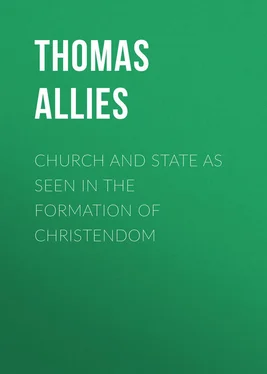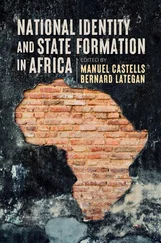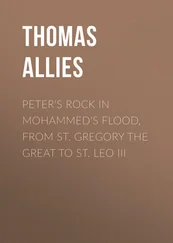Thomas Allies - Church and State as Seen in the Formation of Christendom
Здесь есть возможность читать онлайн «Thomas Allies - Church and State as Seen in the Formation of Christendom» — ознакомительный отрывок электронной книги совершенно бесплатно, а после прочтения отрывка купить полную версию. В некоторых случаях можно слушать аудио, скачать через торрент в формате fb2 и присутствует краткое содержание. ISBN: , Жанр: foreign_antique, foreign_prose, Историческая проза, на английском языке. Описание произведения, (предисловие) а так же отзывы посетителей доступны на портале библиотеки ЛибКат.
- Название:Church and State as Seen in the Formation of Christendom
- Автор:
- Жанр:
- Год:неизвестен
- ISBN:http://www.gutenberg.org/ebooks/38537
- Рейтинг книги:4 / 5. Голосов: 1
-
Избранное:Добавить в избранное
- Отзывы:
-
Ваша оценка:
- 80
- 1
- 2
- 3
- 4
- 5
Church and State as Seen in the Formation of Christendom: краткое содержание, описание и аннотация
Предлагаем к чтению аннотацию, описание, краткое содержание или предисловие (зависит от того, что написал сам автор книги «Church and State as Seen in the Formation of Christendom»). Если вы не нашли необходимую информацию о книге — напишите в комментариях, мы постараемся отыскать её.
Church and State as Seen in the Formation of Christendom — читать онлайн ознакомительный отрывок
Ниже представлен текст книги, разбитый по страницам. Система сохранения места последней прочитанной страницы, позволяет с удобством читать онлайн бесплатно книгу «Church and State as Seen in the Formation of Christendom», без необходимости каждый раз заново искать на чём Вы остановились. Поставьте закладку, и сможете в любой момент перейти на страницу, на которой закончили чтение.
Интервал:
Закладка:
The Pontifex Maximus, though created by the suffrage of the people, was always taken from the College of Pontiffs, and his office was perpetual. Augustus would not take it from Lepidus during his life, though he took it after his death. Thus the power of the Supreme Pontiff was by no means confused with that of the magistrate or the prince; and the assumption of this priesthood by the Cæsars makes it evident that they recognised it not to be part of the prince’s power to intrude into matters of religion; and that they needed a sacerdotal power in order to superintend sacred things. It was for the sake of this superintendence, Dio observes, that the emperor always assumed the office of Pontifex Maximus, in virtue of which he became master of all religious and sacred things.
The example of Cicero pleading before the College of Pontifices for the restoration of his house, which had been dedicated by Clodius to Concord, a plea involving their power to revoke a tribunicial law passed by Clodius, is a remarkable testimony to the pontifical authority: “If ever,” he said, “a great cause rested on the judgment and power of the Priests of the Roman people, it is this; in which all the dignity of the commonwealth, the safety, the life, the liberty, the public and private worship, the household gods, the goods, the fortunes, and the homes of all seem intrusted to your wisdom and integrity.” 16 16 Bianchi, Sect. VI.
The fair conclusions from these facts, says Bianchi again, are that the Romans knew religion to be directed to a higher end than temporal felicity, though they did esteem it also necessary for the preservation of the State; that the power of the priesthood was distinct from the civil power of the magistrate; that it had the right to judge in all cases of religion without interference from the magistrate; that immunity and exemption from the civil power belonged to it.
It is needless to go through the various nations of antiquity in order to show the veneration which everywhere belonged to the office of the priest. That is shown likewise in the frequent connection of the royal power with the priesthood; but though thus connected, they were not confused; kings were priests, not in virtue of their kingship, but by a distinct appointment. Plato asserts that in some nations the priesthood was reputed so excellent that it was not considered to be properly placed save in the person of the king; and that among the Egyptians it was not lawful for any king to command the people without being first consecrated to the priesthood. By this fact is seen how the sacerdotal dignity was esteemed by antiquity, even in the darkness of idolatry; and, at the same time, how the power of the priest was considered to be distinct from the power of the sovereign. Plato gives his own judgment when he says that the creation of priests should be left to the care of God; and that they should be elected by lot, in order that the person destined to so high an office may be divinely chosen. 17 17 Bianchi, p. 23.
All that it is requisite here to point out seems to be that, however great was the degradation of worship produced by the character of the gods worshipped, as well as by the divisions of the godhead which the multiplying of divine beings brought with itself, yet two things survived in the minds of men: one the intrinsic excellence of worship in itself, as the homage paid by man to a power above himself; and the other, the sense that this worship was a thing of divine institution, coming down from heaven upon earth, quite distinct in character from civil rule, and if exercised by kings, exercised not because they were kings, but in virtue of a separate consecration. Thus, if the patriarchal origin of property, law, and government is borne witness to by the most ancient institutions, customs, and feelings of men, which witness likewise extends to the unity of the race, so likewise the original independence of the priestly order as to all its sacred functions and the sense of its divine origin, which runs through so many nations, bear joint witness to the unity of the race and to the truth of the Mosaic record. They convey a manifest contradiction to the theory that man sprung originally from a number of different races, and likewise to the theory that he grew up originally in a state of savagery.
The force of the testimony consists in this: first, a priesthood appears everywhere; secondly, it is connected with the rite of sacrifice; thirdly, it usually comprises an order of men devoted to the purpose of divine worship, or at least having special functions which by no means belong to the civil ruler as such, so that if he performs them, it is as priest and not as king; fourthly, this order has a special authority from the Divine Being or Beings whom it represents, not subject to the civil rule; fifthly, injury to the priest’s person or contravention to his order in divine things is esteemed as an injury done to the God whom he represents.
The peculiarity of a priesthood must therefore be added to the peculiarity of the rite of sacrifice upon which his office rests, and both together form an order of ideas so marked and distinctive as to establish the unity of the race in the several portions of which they appear; and at the same time it establishes, as the common inheritance of that race, an overwhelming sense of human life being founded, preserved, and exalted by a communion between heaven and earth: it is, in short, a sense of man lying in the hand of God.
We have hitherto followed the dispersion of Babel in its Gentile development down to that ultimate issue in which a long and unbroken civilisation is combined with an extreme moral corruption; now let us revert to the divine plan which was followed to repair this evil.
At a certain point of time, when forgetfulness of the divine unity was becoming general, God chose one man out of whom to form a nation, whose function should be the preservation of a belief in this unity. Abraham, the friend of God and the forefather of Christ, was called out of his own country that he might preserve the religion of Noah, and that “in him all the kindreds of the earth might be blessed” (Gen. xii. 3). In the second generation his family was carried down into Egypt, and became, in the security of that kingdom, a people, but it likewise fell into bondage. From this it was redeemed in a series of wonderful events under the guidance of Moses, was led by him into the desert, and there formed into a nation by the discipline of a religious, which was also a civil code. In the law given on Mount Sinai we see once more the constitution of the society established in Noah. The whole moral order of the world contained in the ten commandments is made to rest upon the sovereignty of God: “I am the Lord; thou shalt have no strange gods.” From this precept, which fills the first table, proceed the precepts which, in the second, maintain the order of society: “Honour thy father and thy mother; thou shalt not kill; thou shalt not steal,” and the rest. Such, says Bossuet, is the general order of all legislation. The ten words of God form the core of a complete religious and civil code, in which the two Powers exist in an ideal no less than a practical union. The individual and the national worship is the same, and the society springs out of it, the root being, “I am the Lord;” but the persuasiveness of redemption is added to the power of creation: “I am the Lord thy God, who brought thee out of the land of Egypt, out of the house of bondage.” Abraham, the father of the people, had exercised the patriarchal priesthood and the patriarchal sacrifice in his family; but just as God had not chosen Abraham because he was the first-born, so Moses, taking the patriarchal priesthood, with a special sanction, set it not in the first-born of the tribes, but in another tribe, and in a family of this tribe. He took, further, the rite of sacrifice, which had existed from the beginning, only developing its meaning in a series of ordinances, which, as St. Paul tells us, all pointed to Christ: “Almost all things according to the law are cleansed with blood, and without shedding of blood is no remission” (Heb. ix. 22). But while there is here a complete union in faith, in practice, and in worship, for every true Israelite and for the whole people, while there is one source of authority to the three, the bearers of the dignities which represent this triple life of man are separated. Moses instituted, in the person of Aaron, a high priesthood which from that time stands through the whole history of his people at the head of their worship, superior in all that concerns it to the civil authority, which is bound to consult it and obey it, not only in the things of God, but in the chief civil acts which regard the nation. The outcome of this work is the creation of a people whose function is to bear on the worship of the one true God and faith in the Redeemer to come, a royal, prophetic, and priestly nation, the special domain of the promised Messias.
Читать дальшеИнтервал:
Закладка:
Похожие книги на «Church and State as Seen in the Formation of Christendom»
Представляем Вашему вниманию похожие книги на «Church and State as Seen in the Formation of Christendom» списком для выбора. Мы отобрали схожую по названию и смыслу литературу в надежде предоставить читателям больше вариантов отыскать новые, интересные, ещё непрочитанные произведения.
Обсуждение, отзывы о книге «Church and State as Seen in the Formation of Christendom» и просто собственные мнения читателей. Оставьте ваши комментарии, напишите, что Вы думаете о произведении, его смысле или главных героях. Укажите что конкретно понравилось, а что нет, и почему Вы так считаете.












